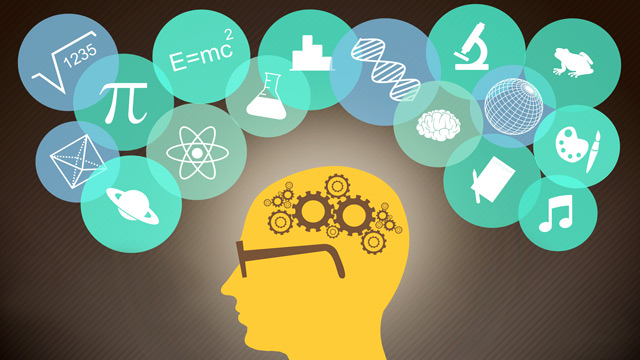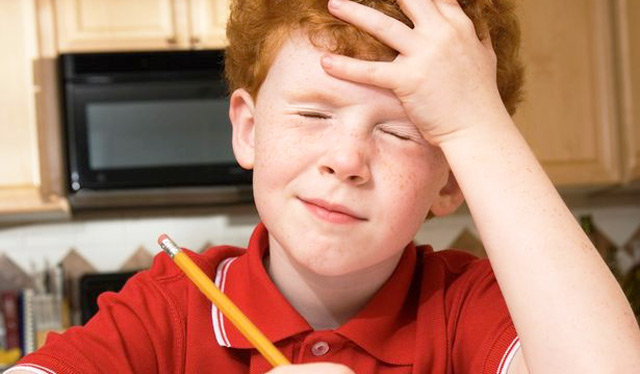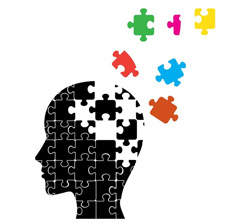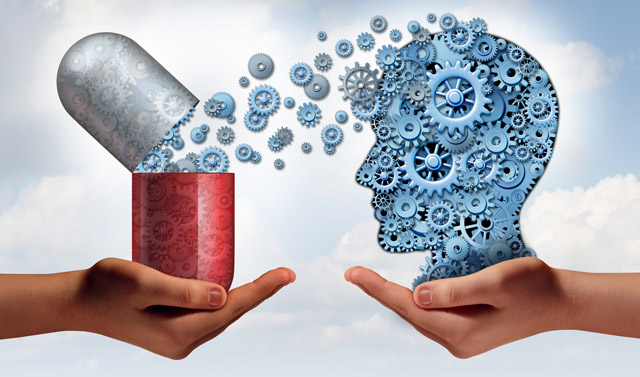Memory disorders: why memory becomes poor, the norm and the relationship with diseases, treatment
Memory disorders: why memory becomes poor, the norm and the relationship with diseases, treatment
Memory is an important function of our central nervous system to perceive the information received and store it in some invisible "cells" of the brain in reserve in order to retrieve and use it in the future. Memory is one of the most important abilities of a person’s mental activity, therefore the slightest violation of memory burdens him, he gets out of the usual rhythm of life, suffering himself and annoying those around him.
Memory impairment is most often perceived as one of the many clinical manifestations of some kind of neuropsychic or neurological pathology, although in other cases forgetfulness, absent-mindedness and poor memory are the only signs of a disease that no one pays attention to, believing that a person is such by nature. .
The big mystery is human memory
Memory is a complex process that takes place in the central nervous system and involves the perception, accumulation, retention and reproduction of information received at different periods of time. Most of all, we think about the properties of our memory when we need to learn something new. The result of all the efforts made in the learning process depends on how someone manages to hook, hold, perceive what they see, hear or read, which is important when choosing a profession. From the point of view of biology, memory is short-term and long-term.
Information received in a glimpse or, as they say, “it flew in one ear, flew out of the other” is a short-term memory in which what is seen and heard is postponed for several minutes, but, as a rule, without meaning and content. So, the episode flashed by and disappeared. Short-term memory does not promise anything in advance, which is probably good, because otherwise a person would have to store all the information that he does not need at all.

However, with certain efforts of a person, information that has fallen into the zone of short-term memory, if you keep your eyes on it or listen and delve into it, will be transferred to long-term storage. This happens even beyond the will of a person, if some episodes are often repeated, have a special emotional significance, or occupy a separate place among other phenomena for various reasons.
Assessing their memory, some people claim that they have a short-term memory, because everything is remembered, assimilated, retold in a couple of days, and then just as quickly forgotten. This often happens when preparing for exams, when information is put aside only for the purpose of reproducing it to decorate a grade book. It should be noted that in such cases, turning again to this topic, when it becomes interesting, a person can easily restore seemingly lost knowledge. It is one thing to know and forget, and another to not receive information. And here everything is simple - the acquired knowledge without much human effort was transformed into departments of long-term memory.
Long-term memory analyzes, structures, creates volume and purposefully postpones everything for future use indefinitely. Everything is kept in long-term memory. Memorization mechanisms are very complex, but we are so used to them that we perceive them as natural and simple things. However, we note that for the successful implementation of the learning process, in addition to memory, it is important to have attention, that is, to be able to concentrate on the right subjects.
It is common for a person to forget past events after a while, if they do not periodically extract their knowledge in order to use them, therefore, the inability to remember something is not always to be attributed to memory impairment. Each of us has experienced the feeling when "it is spinning in the head, but does not come to mind", but this does not mean that serious disorders have occurred in the memory.
Why do memory lapses happen?
The causes of impaired memory and attention in adults and children may be different. If a child with congenital mental retardation immediately has learning problems, then he will already come to adulthood with these disorders. Children and adults can react differently to the environment: the child's psyche is more tender, so it takes stress harder. In addition, adults have long studied what the child is still trying to master.
Sadly, the trend towards the use of alcoholic beverages and drugs by adolescents, and even by young children left unattended by their parents, has become frightening: cases of poisoning are not so rarely recorded in the reports of law enforcement agencies and medical institutions. But for the child's brain, alcohol is the strongest poison that has an extremely negative effect on memory.
True, some pathological conditions that often cause absent-mindedness and poor memory in adults are usually excluded in children (Alzheimer's disease, atherosclerosis, osteochondrosis).

Causes of memory impairment in children
Thus, the causes of impaired memory and attention in children can be considered:
- Lack of vitamins,;
- Asthenia;
- Frequent viral infections;
- Traumatic brain injury;
- Stressful situations (dysfunctional family, despotism of parents, problems in the team that the child attends);
- Poor eyesight;
- Mental disorder;
- Poisoning, alcohol and drug use;
- Congenital pathology, in which mental retardation is programmed (Down's syndrome, etc.) or other (whatever) conditions (lack of vitamins or trace elements, the use of certain drugs, changes in metabolic processes that are not for the better) that contribute to the formation of attention deficit disorder, which, As you know, memory does not improve.
Causes of problems in adults
In adults, the reason that has become a bad memory, absent-mindedness and inability to concentrate for a long time, are various diseases acquired in the process of life:
- Stress, psycho-emotional stress, chronic fatigue of both soul and body;
- Acute and chronic;
- Discirculatory;
- cervical spine;
- Traumatic brain injury;
- Metabolic disorders;
- Hormonal imbalance;
- GM tumors;
- Mental disorders (depression, schizophrenia and many others).
Of course, anemia of various origins, micronutrient deficiencies, diabetes mellitus and numerous other somatic pathologies lead to impaired memory and attention, contribute to forgetfulness and absent-mindedness.
What are the types of memory disorders? Among them are dysmnesia(hypermnesia, hypomnesia, amnesia) - changes in memory itself, and paramnesia- distortion of memories, to which the patient's personal fantasies are added. By the way, some of them, on the contrary, are considered by others to be rather a phenomenal memory than its violation. True, experts may have a slightly different opinion on this matter.
Dysmnesia
Phenomenal memory or mental disorder?
Hypermnesia- with such a violation, people remember and perceive quickly, information set aside many years ago for no reason pops up in memory, “rolls”, returns to the past, which does not always cause positive emotions. A person himself does not know why he needs to keep everything in his head, however, he can reproduce some long-past events to the smallest detail. For example, an elderly person can easily describe in detail (up to the teacher's clothes) individual lessons at school, retell the lithmontage of a pioneer gathering, it is not difficult for him to remember other details related to studying at the institute, professional activities or family events.

Hypermnesia, present in a healthy person in the absence of other clinical manifestations, is not considered a disease, rather, on the contrary, this is exactly the case when they talk about phenomenal memory, although from the point of view of psychology, phenomenal memory is a slightly different phenomenon. People with this phenomenon are able to memorize and reproduce huge amounts of information that is not connected with any special meaning. These can be large numbers, sets of individual words, lists of objects, notes. Such a memory is often possessed by great writers, musicians, mathematicians and people of other professions that require genius abilities. Meanwhile, hypermnesia in a healthy person who does not belong to the cohort of geniuses, but has a high intelligence quotient (IQ), is not such a rare occurrence.
As one of the symptoms of pathological conditions, memory impairment in the form of hypermnesia occurs:
- With paroxysmal mental disorders (epilepsy);
- With intoxication with psychoactive substances (psychotropic drugs, narcotic drugs);
- In the case of hypomania - a condition similar to mania, but not up to it in terms of the severity of the course. Patients may experience a surge of energy, increased vitality, and ability to work. With hypomania, a violation of memory and attention is often combined (disinhibition, instability, inability to concentrate).
It is obvious that only a specialist can understand such subtleties, distinguish between the norm and pathology. Most of us are average representatives of the human population, to whom "nothing human is alien", but at the same time they do not turn the world upside down. From time to time (not every year and not in every locality) geniuses appear, they are not always immediately noticeable, because often such individuals are considered simply eccentrics. And, finally, (perhaps not often?) among the various pathological conditions there are mental illnesses that require correction and complex treatment.
bad memory
Hypomnesia- this type is usually expressed in two words: "bad memory."

Forgetfulness, absent-mindedness and poor memory are observed with asthenic syndrome, which, in addition to memory problems, is also characterized by other symptoms:
- Increased fatigue.
- Nervousness, irritability with or without it, bad mood.
- Meteorological dependence.
- during the day and insomnia at night.
- BP drops, .
- Tides and others.
- , weakness.
Asthenic syndrome, as a rule, forms another pathology, for example:
- Arterial hypertension.
- Postponed traumatic brain injury (TBI).
- atherosclerotic process.
- The initial stage of schizophrenia.
The cause of impaired memory and attention according to the type of hypomnesia can be various depressive conditions (you can’t count everyone), menopausal syndrome that occurs with an adaptation disorder, organic brain damage (severe TBI, epilepsy, tumors). In such situations, as a rule, in addition to hypomnesia, the symptoms listed above are also present.
"I remember here - I don't remember here"
At amnesia not the whole memory falls out, but its individual fragments. As an example of this type of amnesia, one would like to recall the film by Alexander Gray "Gentlemen of Fortune" - "I remember here - I don't remember here."
However, not all amnesias look like in the famous motion picture, there are more serious cases when memory is lost significantly and for a long time or forever, therefore, several types of such memory impairments (amnesia) are distinguished:

A special type of memory loss that cannot be managed is progressive amnesia, representing a sequential loss of memory from the present to the past. The reason for the destruction of memory in such cases is organic atrophy of the brain, which occurs during Alzheimer's disease and . Such patients poorly reproduce traces of memory (speech disorders), for example, they forget the names of household items that they use daily (plate, chair, clock), but at the same time they know what they are intended for (amnestic aphasia). In other cases, the patient simply does not recognize the thing (sensory aphasia) or does not know what it is for (semantic aphasia). However, one should not confuse the habits of “radical” owners to find a use for everything that is in the house, even if it is intended for completely different purposes (you can make a beautiful dish or stand out of a used kitchen clock in the form of a plate).
This is what you need to figure out!

Paramnesia (distortion of memories) also referred to as memory disorders, and among them are the following types:
- Confabulation, in which fragments of one’s own memory disappear, and their place is taken by stories invented by the patient and presented to them “in all seriousness”, since he himself believes in what he is talking about. Patients talk about their exploits, unprecedented achievements in life and work, and even sometimes about crimes.
- pseudo-reminiscence- the replacement of one memory with another event that actually took place in the patient's life, only at a completely different time and under different circumstances (Korsakov's syndrome).
- Cryptomnesia when patients, having received information from various sources (books, movies, stories of other people), pass it off as events they experienced. In a word, patients, due to pathological changes, go to involuntary plagiarism, which is characteristic of delusional ideas found in organic disorders.
- Echomnesia- a person feels (quite sincerely) that this event has already happened to him (or did he see it in a dream?). Of course, such thoughts sometimes visit a healthy person, but the difference is that patients attach special significance to such phenomena (“go in cycles”), while healthy people simply quickly forget about it.
- Polympsest- this symptom exists in two versions: short-term memory lapses associated with pathological alcohol intoxication (episodes of the past day are confused with long-past events), and the combination of two different events of the same period of time, in the end, the patient himself does not know what happened in fact.
As a rule, these symptoms in pathological conditions are accompanied by other clinical manifestations, therefore, having noticed signs of “déjà vu” in oneself, there is no need to rush to make a diagnosis - this also happens in healthy people.
Decreased concentration affects memory
To violations of memory and attention, the loss of the ability to focus on specific objects include the following pathological conditions:
- Attention instability- a person is constantly distracted, jumping from one subject to another (disinhibition syndrome in children, hypomania, hebephrenia - a mental disorder that develops as a form of schizophrenia in adolescence);
- Rigidity (slow switching) from one topic to another - this symptom is very typical for epilepsy (those who communicated with such people know that the patient is constantly “stuck”, which makes it difficult to conduct a dialogue);
- Lack of concentration- they say about such people: “That’s what a distracted one from Basseinaya Street!”, That is, absent-mindedness and poor memory in such cases are often perceived as features of temperament and behavior, which, in principle, often corresponds to reality.
Undoubtedly a decrease in concentration of attention, in particular, will adversely affect the entire process of memorizing and storing information, that is, on the state of memory as a whole.
Children forget faster
As for children, all these gross, permanent memory impairments, characteristic of adults and, especially, the elderly, are very rarely noted in childhood. Memory problems that arise due to congenital features require correction and, with a skillful approach (as far as possible), may recede a little. There are many cases when the efforts of parents and teachers literally worked wonders for Down syndrome and other types of congenital mental retardation, but here the approach is individual and dependent on different circumstances.

Another thing is if the baby was born healthy, and the problems appeared as a result of the troubles suffered. So here a child can expect a slightly different reaction to different situations:
- Amnesia in children in most cases, it manifests itself as memory lapses in relation to individual memories of episodes that took place during the period of clouding of consciousness associated with unpleasant events (poisoning, coma, trauma) - it is not in vain that they say that children quickly forget;
- Alcoholization of adolescence also proceeds differently than in adults - the absence of memories ( polympsests) on events occurring during intoxication, appears already in the first stages of drunkenness, without waiting for a diagnosis (alcoholism);
- retrograde amnesia in children, as a rule, it affects a short period of time before an injury or illness, and its severity is not as clear as in adults, that is, memory loss in a child can not always be noticed.
Most often in children and adolescents there is a memory impairment of the type of dysmnesia, which is manifested by a weakening of the ability to remember, store (retention) and reproduce (reproduction) the information received. Disorders of this type are more noticeable in school-age children, as they affect school performance, adaptation in a team, and behavior in everyday life.
In children attending preschool institutions, symptoms of dysmnesia are problems with memorizing rhymes, songs, children cannot participate in children's matinees and holidays. Despite the fact that the kid attends kindergarten all the time, every time he comes there, he cannot find his locker on his own to change clothes, among other items (toys, clothes, towels) it is difficult for him to find his own. Dysmnestic disorders are also noticeable at home: the child cannot tell what happened in the garden, forgets the names of other children, each time he reads fairy tales he perceives as if he hears them for the first time, he does not remember the names of the main characters.
Transient disturbances of memory and attention, along with fatigue, drowsiness and all sorts of autonomic disorders, are often observed in schoolchildren with various etiologies.
Before treatment

Before treating the symptoms of memory impairment, it is necessary to make a correct diagnosis and find out what causes the patient's problems. To do this, you need to get as much information about his health:
- What diseases does he suffer from? Perhaps it will be possible to trace the connection between the existing pathology (or transferred in the past) with the deterioration of intellectual abilities;
- Does he have a pathology that directly leads to memory impairment: dementia, cerebrovascular insufficiency, TBI (history), chronic alcoholism, drug disorders?
- What medications does the patient take and is memory impairment related to the use of medications? Some groups of pharmaceuticals, for example, benzodiazepines, among the side effects, have such disorders, which, however, are reversible.
In addition, in the process of diagnostic search, it can be very useful to identify metabolic disorders, hormonal imbalance, deficiency of trace elements and vitamins.
In most cases, when looking for the causes of memory impairment, they resort to methods neuroimaging(CT, MRI, EEG, PET, etc.), which help to detect a brain tumor or hydrocephalus and, at the same time, to differentiate a vascular brain lesion from a degenerative one.
The need for neuroimaging methods also arises because memory impairment at first may be the only symptom of a serious pathology. Unfortunately, the greatest difficulties in diagnosis are depressive conditions, forcing in other cases to prescribe a trial antidepressant treatment (to find out if there is depression or not).
Treatment and correction
The normal aging process itself involves some decline in intellectual abilities: forgetfulness appears, memorization is not so easy, concentration of attention drops, especially if the neck is “squeezed” or pressure rises, however, such symptoms do not significantly affect the quality of life and behavior in everyday life. Older people who adequately assess their age learn to remind themselves (and quickly remember) about current affairs.

In addition, many do not neglect pharmaceutical treatment to improve memory.
Now there are a number of drugs that can improve brain function and even help with tasks that require significant intellectual effort. First of all, these are (piracetam, phezam, vinpocetine, cerebrolysin, cinnarizine, etc.).
Nootropics are indicated for elderly people who have certain age-related problems that are not yet noticeable to others. Preparations of this group are suitable for improving memory in violation of cerebral circulation caused by other pathological conditions of the brain and vascular system. By the way, many of these drugs are successfully used in pediatric practice.
However, nootropics are a symptomatic treatment, and in order to obtain the proper effect, one must strive for an etiotropic one.
As for Alzheimer's disease, tumors, mental disorders, here the approach to treatment should be very specific - depending on the pathological changes and the reasons that led to them. There is no single prescription for all cases, so there is nothing to advise patients. You just need to contact a doctor, who, perhaps, before prescribing drugs to improve memory, will send for an additional examination.
Difficult in adults and the correction of disorders of mental activity. Patients with poor memory, under the supervision of an instructor, memorize verses, solve crossword puzzles, practice solving logical problems, however, training, bringing some success (the severity of mnestic disorders seems to have decreased), still do not give particularly significant results.
Correction of memory and attention in children, in addition to treatment with the help of various groups of pharmaceuticals, provides for classes with a psychologist, exercises for the development of memory (poems, drawings, tasks). Of course, the children's psyche is more mobile and better amenable to correction, unlike the adult psyche. Children have the prospect of progressive development, while in older people only the opposite effect progresses.
